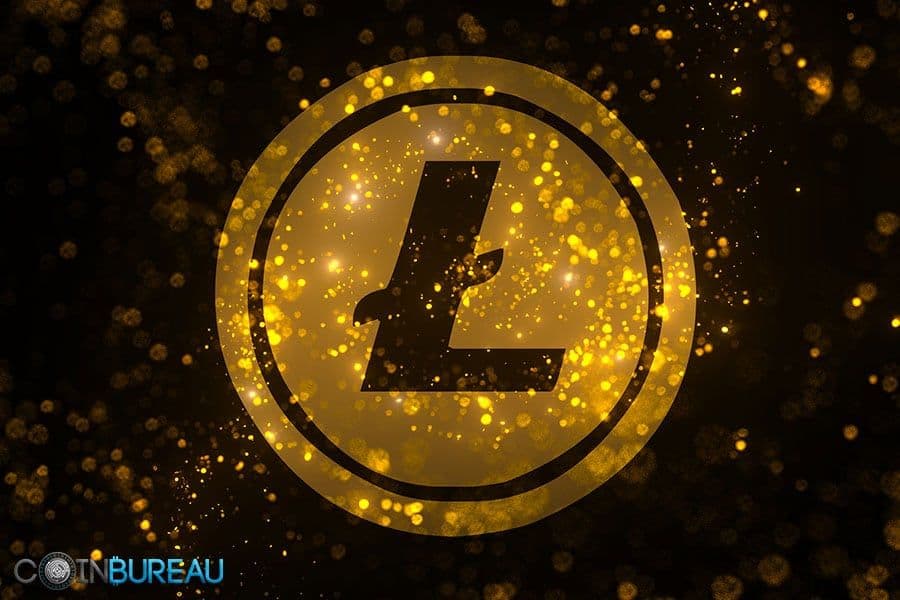As 2024 unfolds, the cryptocurrency market continues to be a hotbed of innovation and growth, with Litecoin (LTC) maintaining its position as one of the stalwarts of the digital currency world. Unlike the ephemeral nature of many newer cryptocurrencies, Litecoin has demonstrated enduring appeal and stability, reflecting its established infrastructure and a dedicated community that has supported its journey since 2011.
Throughout its history, Litecoin has been lauded for its quick transaction times and low fees, which have been instrumental in its adoption for both investment and transactional purposes. While it may not always grab headlines like some of the more volatile coins, Litecoin's consistency and reliability have fostered a loyal user base and sustained interest from investors seeking a blend of stability and potential growth in the crypto space.
This buying Litecoin guide is designed to demystify the process of buying Litecoin and aims to help equip you with the knowledge needed to navigate the intriguing landscape of cryptocurrencies. For seasoned traders, it will serve as a refresher on the updated means for buying their favorite digital assets.
If you’re unfamiliar with Litecoin, we have an in-depth Litecoin review that covers this legacy cryptocurrency. For the visual learners, Guy’s Litecoin breakdown on YouTube will prove more stimulating:
Before diving into this LTC buying guide, it is helpful to answer the question briefly:
What is Litecoin?
Charlie Lee, a former Google engineer, created Litecoin in 2011 as a "lighter" version of Bitcoin with faster transactions and lower fees. Litecoin uses similar technology to Bitcoin but differs in a few key ways, such as its hashing algorithm and block generation time.
Litecoin is considered a complementary digital asset to Bitcoin, often referred to as "digital silver" compared to Bitcoin's "digital gold." It's open-source and managed by the Litecoin Foundation.
Like Bitcoin, Litecoin uses a proof-of-work system for mining and securing its network. It has faster block generation times (2.5 minutes) compared to Bitcoin (10 minutes) and offers lower transaction fees.
The digital asset reached popularity from crypto users who preferred to hold Bitcoin as an investment but use Litecoin as a form of cash as it benefited users with lower transaction fees and faster transaction times.
If you want to dive deeper into this digital asset's history, use cases and technicals, you can learn more in our dedicated Litecoin 101 Guide.
Where to Buy Litecoin
Litecoin has carved out its niche and appeals to diverse investment strategies and crypto users in the dynamic world of digital currencies.
The avenues for purchasing Litecoin vary, each catering to different investor needs and preferences. From financial apps like PayPal to centralized and decentralized exchanges, the choice of platform can significantly influence your investment experience. This section explores these options, guiding you in navigating these platforms and identifying which investor profile best aligns with each.
It may also be helpful to note that despite Litecoin's lack of attention-capturing headlines, LTC is the second most widely available and accepted cryptocurrency in the world, second only to Bitcoin.
Buying Litecoin on PayPal
Buying Litecoin on PayPal represents a convenient option for users seeking a straightforward and secure method to invest in cryptocurrencies. PayPal's user-friendly interface simplifies the process, making it accessible even for those new to the crypto world. However, this convenience is primarily available in regions where PayPal supports cryptocurrency transactions, such as the United States. In these areas, PayPal offers a seamless experience, integrating cryptocurrency purchases alongside traditional financial services.
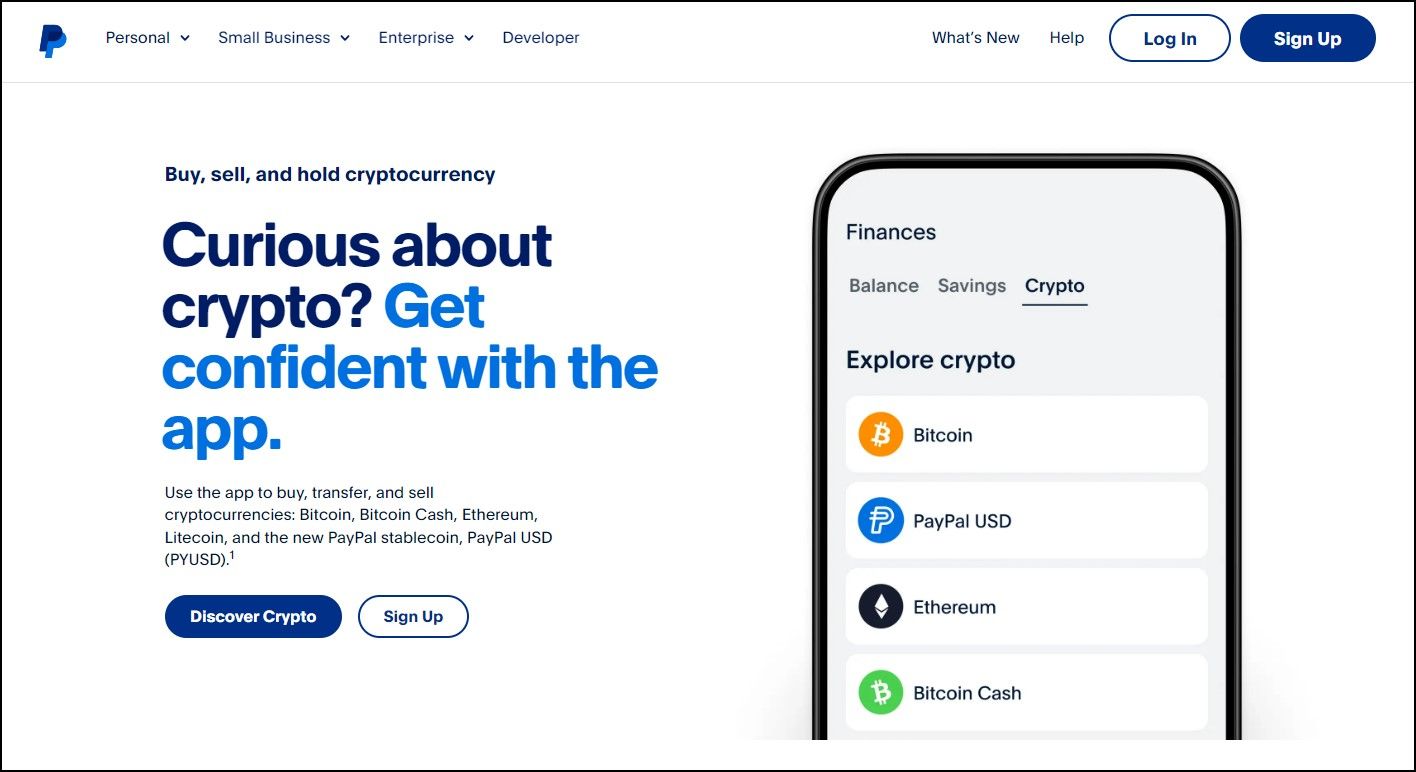 PayPal Offers Cryptocurrency Custodial Services | Image via PayPal
PayPal Offers Cryptocurrency Custodial Services | Image via PayPalIdeal Investor Profile:
- Reason for Ownership: Suited for investors eyeing price potential or those looking to hold Litecoin as a diversified asset in their portfolio.
- Cost: Ideal for investors who prefer transparent, upfront costs over the intricacies of exchange-based trading fees or on-chain transaction costs.
- Duration of Investment: More aligned with investors leaning towards short-term holding, given the ease of access and liquidity.
- Security: Appeals to those prioritizing transaction security and the reliability of a well-established financial service provider.
- Privacy: Best for investors comfortable with trading off some degree of privacy for regulatory compliance and security.
- Technical Knowledge: Suitable for individuals with limited technical knowledge of cryptocurrencies seeking a straightforward buying process.
- Ecosystem and Development Activity: Fits investors who may not be deeply involved in the Litecoin ecosystem but are interested in its broader market performance.
Step-by-Step Guide to Buying Litecoin on PayPal
Step 1: Set Up a PayPal Account
- Create an Account: If you don't already have a PayPal account, visit the PayPal website or download the app to create one. Provide the necessary personal information, such as your name, email address, and bank account or card details.
- Verify Your Account: Complete any PayPal verification processes, which may include confirming the email address linked to your bank account or card and providing KYC details.
Step 2: Add Funds to Your Account
- Link Your Bank Account or Card: If you haven't already, link a bank account or card to your PayPal account to fund your purchases.
- Deposit Funds: Transfer funds from your bank account or card to your PayPal balance to prepare for your purchase.
Step 3: Purchase LTC
- Navigate to Crypto Section: On the PayPal dashboard, find the crypto section or use the search feature to locate the option to buy cryptocurrencies.
- Select Litecoin: Choose Litecoin from the list of available cryptocurrencies.
- Buy Litecoin: Enter the amount of Litecoin you wish to purchase or the amount of fiat currency you want to spend. Review the transaction details, including any fees and the exchange rate provided by PayPal.
- Confirm Purchase: Finalize your purchase by confirming the transaction. Your Litecoin will be added to your PayPal cryptocurrency balance.
Step 4: Manage Your Litecoin
- View Your Balance: You can view your crypto balances and transaction history within the PayPal app or website.
- Selling: You can sell your crypto assets or use them to make purchases with merchants who accept PayPal for cryptocurrency transactions directly through the platform.
Important Considerations and Implications
- Ownership: When you buy any cryptocurrency on PayPal, you're buying a representation of the asset. You won't have access to the private keys or the ability to transfer your assets to other wallets.
- Fees: Be aware of the fees associated with buying, selling, and potentially using Litecoin on PayPal, as these can vary and affect your investment. The platform charges as much as 10-2.5% for small purchases while 1.5% for transactions above $1000. Check the latest fee structure on PayPal before making any purchases.
- Liquidity and Accessibility: While PayPal offers convenience, it may limit how you can use or transfer your assets compared to traditional cryptocurrency exchanges.
- Security: Consider the security implications of holding cryptocurrency in a PayPal account versus a dedicated cryptocurrency wallet.
Buying Litecoin on Centralized Exchanges
Centralized exchanges offer a structured and regulated platform for buying, selling, and trading cryptocurrencies, including Litecoin. These exchanges provide a user-friendly interface, various trading tools, and a secure environment to engage with digital assets. While each exchange has nuances, the core experience across all platforms remains consistent, offering liquidity, a range of trading pairs, and varying degrees of user support and security features.
Ideal Investor Profile:
- Reason for Ownership: Perfect for those looking at price potential or seeking asset ownership for diversification.
- Cost: Attracts investors mindful of trading costs, seeking a balance between competitive fees and service quality.
- Duration of Investment: Suitable short-term traders, offering necessary tools and storage options.
- Security: Appeals to investors who prioritize security but are comfortable with the risks associated with holding assets on a centralized platform.
- Privacy: Ideal for users who accept KYC/AML procedures for the benefits of enhanced security and regulatory compliance.
- Technical Knowledge: Fits investors with a range of technical expertise, from beginners to experienced traders.
- Ecosystem and Development Activity: Attracts those interested in the broader Litecoin ecosystem and market trends.
Buying Litecoin on Coinbase
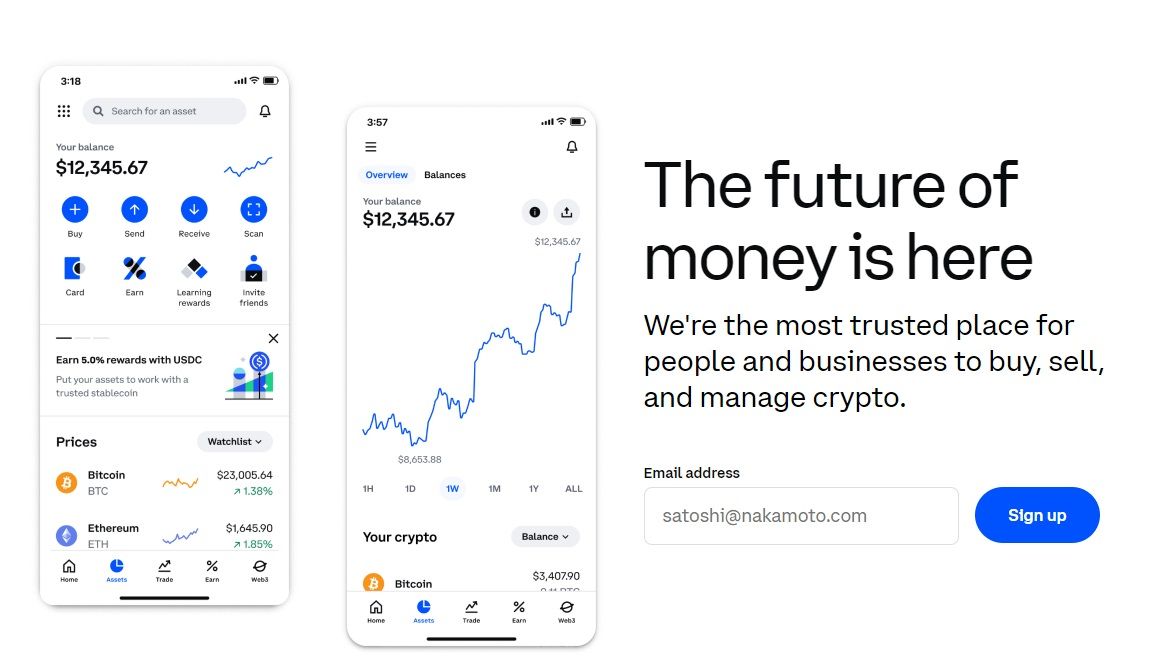 Coinbase is the Leading Cryptocurrency Exchange in the US | Image via Coinbase
Coinbase is the Leading Cryptocurrency Exchange in the US | Image via CoinbaseCoinbase, a US-registered and listed company, stands out for its regulatory compliance and beginner-friendly platform, making it a preferred choice for American users. It provides a straightforward and secure environment to buy, hold, and sell Litecoin, supporting users with various tools and resources to navigate the crypto market confidently.
Buying Litecoin on OKX
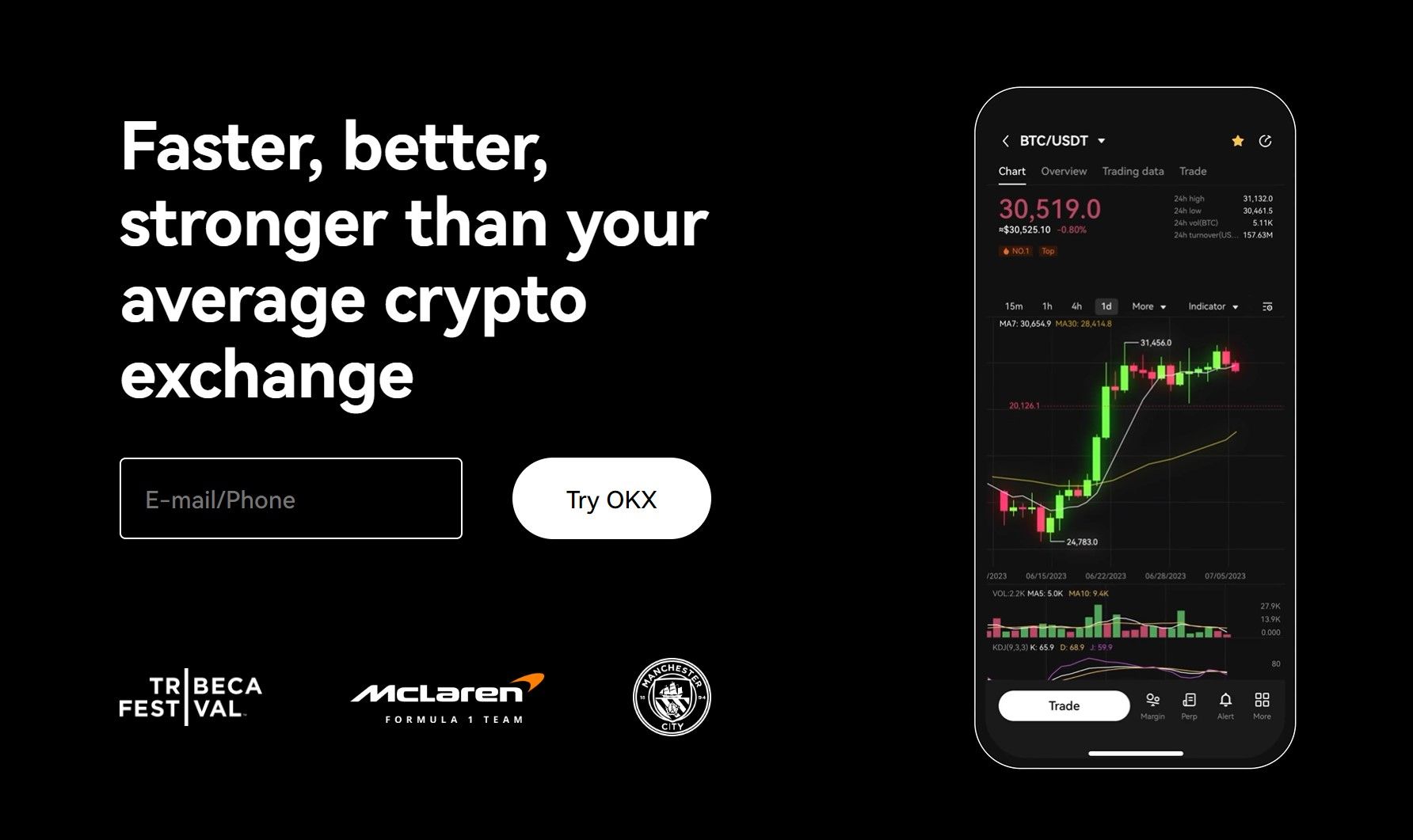 OKX is a Seychelles-headquartered Cryptocurrency Exchange. Image via OKX
OKX is a Seychelles-headquartered Cryptocurrency Exchange. Image via OKXOKX distinguishes itself with competitive fees, a diverse selection of trading pairs, and advanced trading features, catering to a broad spectrum of investors. Beyond traditional exchange services, OKX extends into DeFi and on-chain services, offering a comprehensive crypto experience for users seeking more than just trading.
👉 Coin Bureau readers can enjoy an exclusive 40% off trading fees on OKX and up to $20k in bonuses by using the Coin Bureau Sign-up link.
You can find out why OKX has made it into our Top Exchanges List by checking out our detailed OKX Review.
Buying Litecoin on Binance
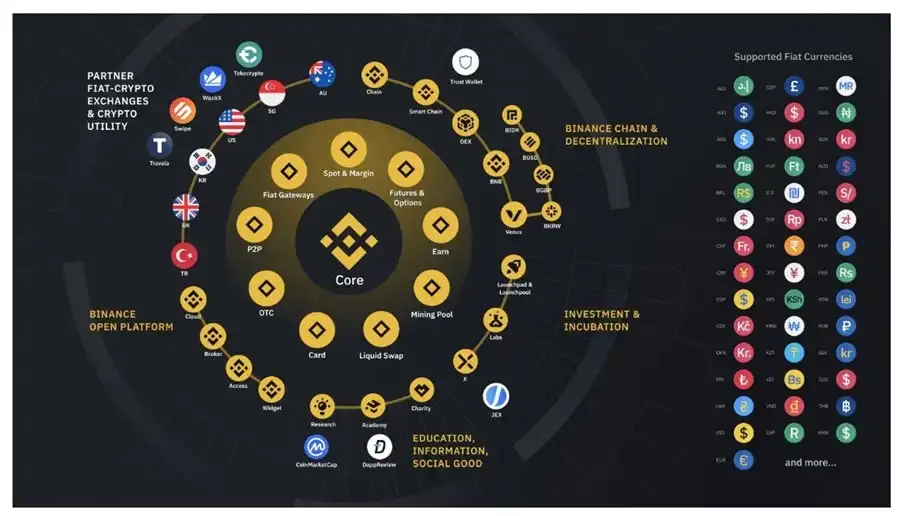 A Look at the Binance Ecosystem. Image via Binance
A Look at the Binance Ecosystem. Image via BinanceBinance, the largest centralized cryptocurrency exchange globally, is renowned for its high liquidity, competitive fees, and extensive range of trading tools and products. It provides a robust platform for buying Litecoin, accommodating users with varied investment strategies and technical expertise.
How to Buy Litecoin on Centralized Exchanges
- Create an Account: Sign up for the exchange, providing the necessary personal details.
- Complete KYC: Verify your identity by completing the Know Your Customer (KYC) process.
- Deposit Funds: Transfer fiat or cryptocurrency to your exchange wallet.
- Search for Litecoin: Find the Litecoin trading pair (e.g., LTC/USDT) on the platform.
- Place an Order: Choose between a market order (buy immediately at current price) or a limit order (set a price at which you want to buy).
- Execute the Trade: Confirm and execute your order to buy Litecoin.
- Secure Your Litecoin: Consider transferring your LTC to a personal wallet for added security.
Note: While these steps are general, the exact process can vary slightly across different exchanges. Comprehensive guides on Coin Bureau cover specific procedures for each major centralized exchange. Follow these links for dedicated trading guides:
Important Considerations and Implications
- Security: Understand the security measures of the exchange, but be aware of the inherent risks of holding assets online.
- Ownership: Remember, when using exchanges, you may not hold the private keys to your Litecoin.
- Fees: Be cognizant of the trading fees and withdrawal costs, which can vary across platforms.
- Regulatory Compliance: Centralized exchanges adhere to regulatory requirements, impacting your privacy and trading experience.
- Accessibility: Ensure the exchange is supported in your region and offers the desired trading pairs and services.
👉 Coin Bureau readers can use our Binance Sign Up link and save 20% on trading fees for life!
From the UK?
eToro is a solid FCA-approved platform where UK users can buy and sell cryptocurrencies such as Bitcoin, Litecoin, Ethereum and more plus a plethora of stocks and other assets.
Disclaimer: Don't invest unless you're prepared to lose all the money you invest. Cryptocurrency is a high-risk investment and you should not expect to be protected if something goes wrong.
Fees Associated With Buying Litecoin
When purchasing Litecoin, several factors influence the fees you'll encounter:
- Platform Type: Different platforms, like centralized exchanges (CEX) and financial apps like PayPal, have varying fee structures.
- Trade Volume: Many exchanges offer lower fees for higher trade volumes, benefiting more active traders.
- Transaction Size: Some platforms use a sliding scale where fees decrease as the transaction amount increases.
- Market Conditions: In times of high volatility, fees may be adjusted to account for increased risk.
- Payment Method: The fees can vary depending on whether you use bank transfers, credit cards, or other payment methods.
- User Tier: Some platforms categorize users into tiers based on their trading volume or account balance, which can affect fees.
Below is a comparative table of the fees associated with buying Litecoin on various platforms. Note that these values are approximate and can vary based on the specific conditions and policies of each platform.
| Platform | Fee Structure | Notes |
|---|---|---|
| Centralized Exchanges (CEX) | Average ~0.1% - 0.5% | Fees vary based on platform and trade volume. Binance.US, Coinbase, and Kraken are included in this category. |
| PayPal | 10-2.5% for transactions under $200, sliding scale down to 1.5% for transactions over $1,000 | Includes spread and transaction fees. Lower fees for larger transactions. |
This table provides a snapshot of the potential costs of buying Litecoin, but always check the latest fee structure on the platform you choose.
Tax Implication of Buying Litecoin
Taxation on cryptocurrency transactions can vary significantly across different jurisdictions, reflecting the diverse regulatory environments worldwide. Most countries view cryptocurrencies like Litecoin as property or investments, imposing taxes based on capital gains or losses. However, the specifics can differ, so it's crucial for investors to understand the tax laws in their respective countries.
General Tax Considerations for Cryptocurrency:
- Capital Gains Tax: If you sell Litecoin for more than you purchased it for, you may be liable for capital gains tax on the profit.
- Income Tax: Earning Litecoin through mining or as payment for services rendered is often taxed as income at the market value of Litecoin on the day it was received.
- Gift or Inheritance Tax: Receiving Litecoin as a gift or inheritance may be subject to different tax rules, depending on local laws.
- Tax Reporting: Investors are typically required to report their cryptocurrency transactions and may need to keep detailed records of their trading activity, including dates, amounts, and market values.
Tax Breakdown for U.S. Investors:
In the United States, the IRS treats cryptocurrencies as property for tax purposes, meaning buying, selling, trading, or using Litecoin to purchase goods or services has tax implications.
- Buying Litecoin: Simply purchasing Litecoin with fiat currency and holding it does not trigger a taxable event. Taxes are incurred when a disposal occurs, such as selling Litecoin or using it to buy goods or services.
- Selling Litecoin: Selling Litecoin for fiat currency or exchanging it for another cryptocurrency triggers a capital gains tax event. The gain or loss is calculated based on the difference between the selling price and the cost basis (the original purchase price plus any applicable fees).
- Using Litecoin for Purchases: Using Litecoin to purchase goods or services is considered a disposal of assets and is taxed similarly to selling Litecoin, where the cost basis is subtracted from the value of the goods or services purchased to determine the gain or loss.
- Record-Keeping: U.S. taxpayers are required to keep detailed records of their cryptocurrency transactions, including the date of transactions, the value in USD at the time of the transaction, and the amount of Litecoin bought or sold.
- Reporting: U.S. investors must report their cryptocurrency transactions on their tax returns, using forms like Schedule D (Form 1040) for capital gains and losses and Form 8949 to detail individual transactions.
Since tax regulations can change and vary by country, it's always recommended to consult with a tax professional knowledgeable about the specific cryptocurrency tax laws in your jurisdiction to ensure compliance and optimize your tax strategy.
Check out our article on the Top Crypto Tax Tools that can help streamline tax season.
How to Buy Litecoin: Closing Thoughts
Whether you're a novice investor or seasoned in the crypto world, choosing the right avenue—financial apps, centralized exchanges, or decentralized platforms—depends on your investment goals and preferences.
Remember, the costs associated with acquiring and holding Litecoin can impact your overall investment returns. Additionally, staying informed about the tax obligations in your jurisdiction is crucial to ensure compliance and avoid unforeseen liabilities. By carefully considering these aspects, you can make more informed decisions about investing in Litecoin, aligning your strategies with your financial objectives.




